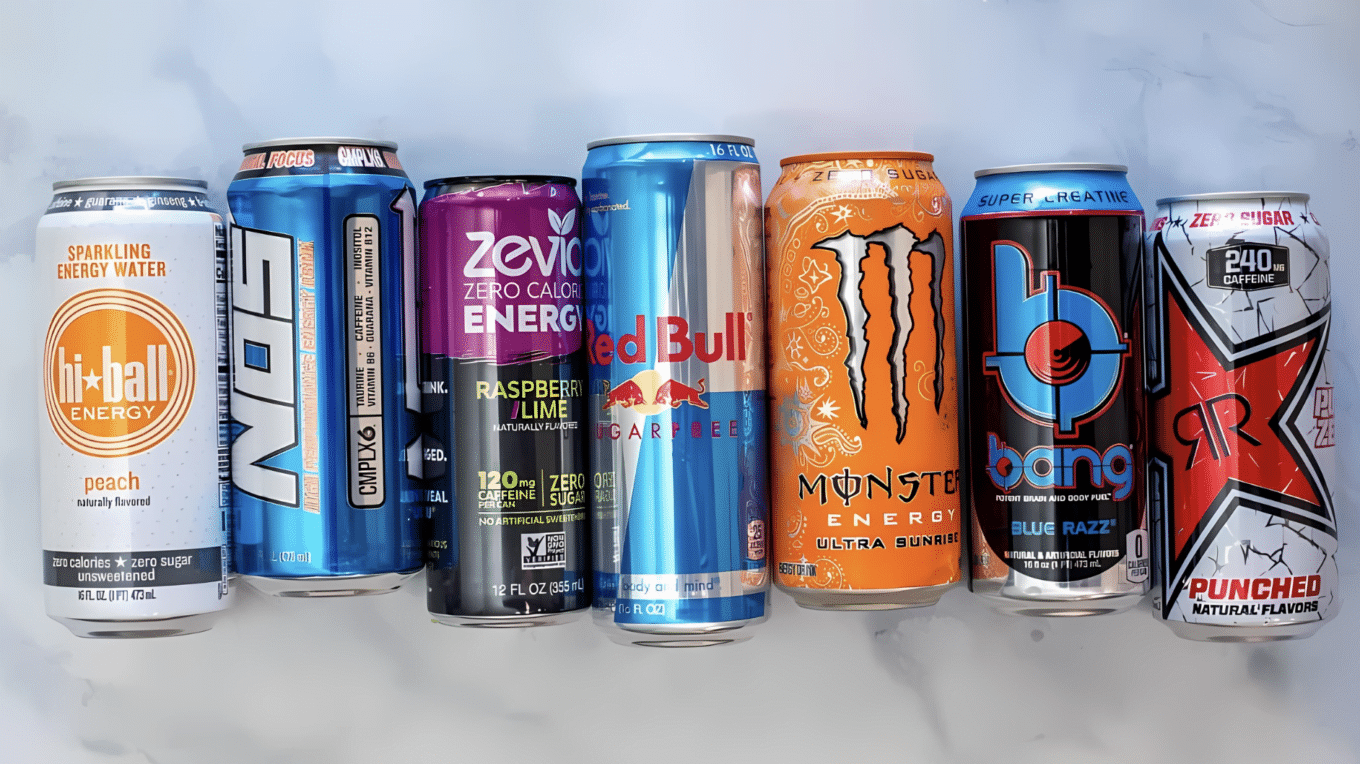Are you constantly looking for that perfect energy boost to power through your day? You’re not alone.
With a dizzying array of energy drinks on the market, it can be challenging to know which packs the right punch without going overboard.
Bang Energy has emerged as a popular choice, but how does its caffeine content compare to other options?
In this article, we’ll explore the world of energy drinks, focusing on Bang and its competitors.
We’ll break down the caffeine levels in various brands, help you understand what these numbers mean for your body, and provide insights on making informed choices.
Whether you’re a fitness enthusiast, a busy professional, or just curious about caffeine intake.
This guide will equip you with the knowledge to navigate the energy drink landscape confidently.
Caffeine Content in Bang Energy Drink
Each 16-fluid-ounce can of Bang Energy contains 300 milligrams of caffeine, a content that remains consistent across all Bang flavors.
In addition to caffeine, Bang also includes Creatine, BCAAs, and B Vitamins to enhance its energy-boosting effects.
Bang’s caffeine content is notably higher than many traditional energy drinks. This high caffeine level makes Bang popular for those seeking a substantial energy boost.
However, consumers need to be aware of their caffeine intake, as 300 mg is a significant amount.
Comparison of Caffeine Content in Popular Energy Drinks
| Energy Drink | Caffeine Content (mg) | Serving Size (fl oz) |
|---|---|---|
| Bang | 300 | 16.0 |
| Red Bull | 80 | 8.4 |
| Monster Energy | 160 | 16.0 |
| 5-Hour Energy | 200 | 2.0 |
| Reign Total Body Fuel | 300 | 16.0 |
| Spike Hardcore Energy | 350 | 16.0 |
Popular Energy Drinks
1. Red Bull
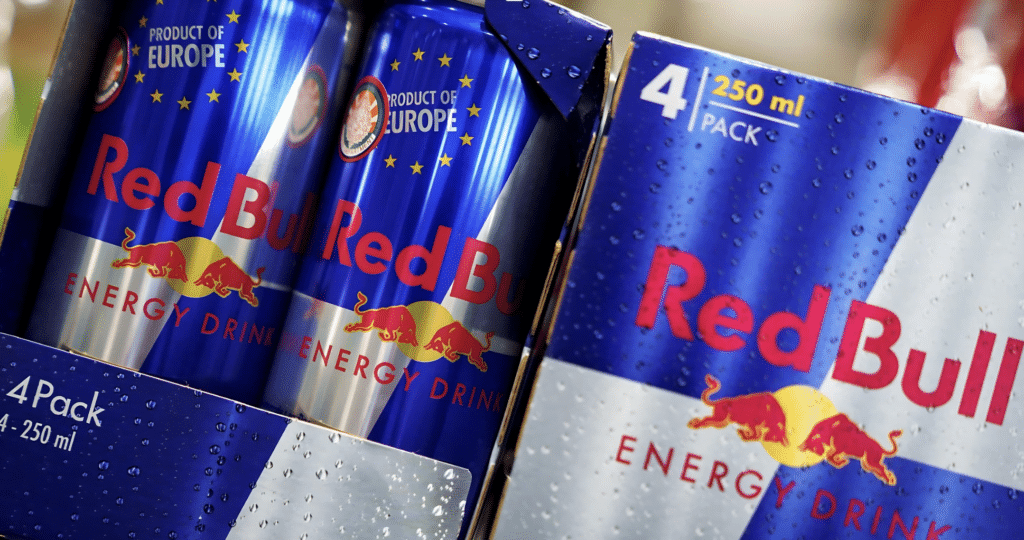
Red Bull contains 80 mg of caffeine in each 8.4 fl oz can. This modest caffeine content has played a key role in its widespread popularity and long-standing market presence.
While Red Bull’s caffeine content is lower than that of newer competitors, It offers a balanced energy boost that many consumers find appealing.
The drink’s effectiveness isn’t solely due to caffeine. Red Bull combines its caffeine with ingredients like taurine and B vitamins, creating a synergistic blend that provides a quick, refreshing energy lift.
2. Monster Energy
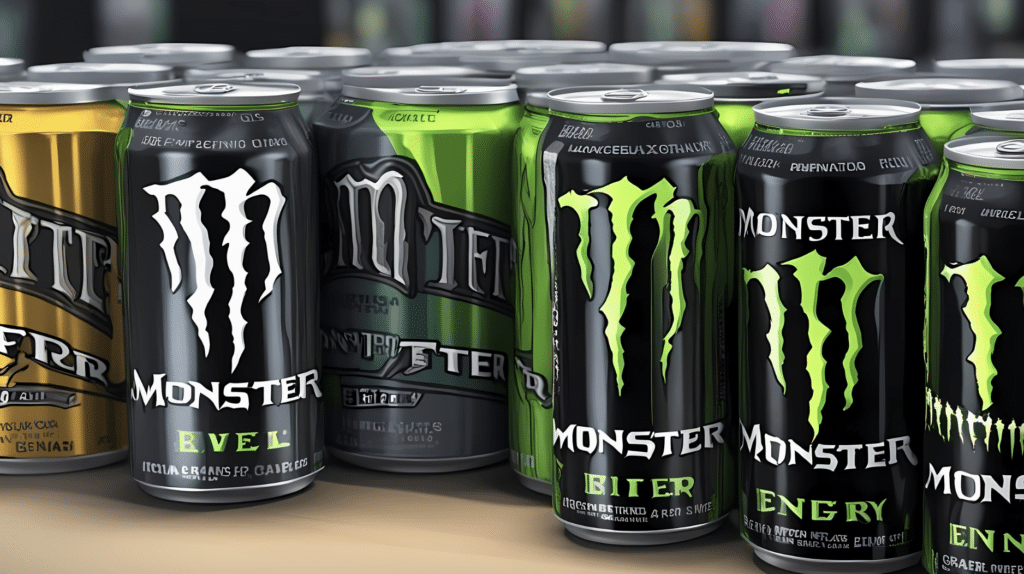
Monster Energy delivers 160 mg of caffeine in each 16 fl oz can. This popular brand stands out for its diverse flavors, catering to various tastes.
Monster also offers sugar-free options for those watching their sugar intake.
Beyond caffeine, Monster’s energy blend includes ginseng, B vitamins, and taurine. This combination aims to provide a comprehensive energy boost, appealing to consumers seeking more than just a caffeine hit.
Monster’s formula and variety have helped establish it as a major player in the energy drink market.
3. 5-Hour Energy
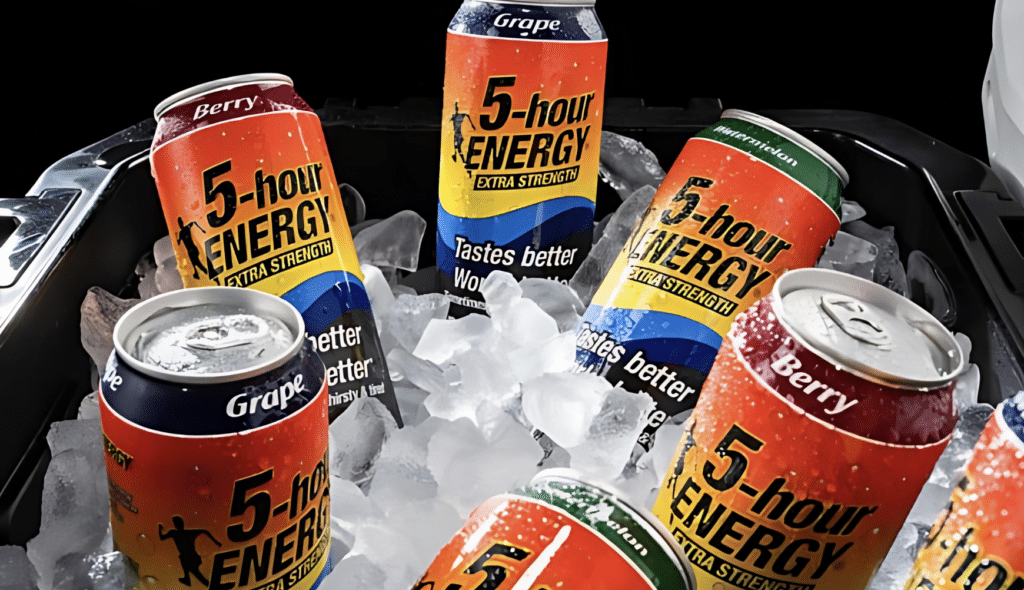
5-Hour Energy packs a powerful 200 mg of caffeine into a compact 2 fl oz shot. This concentrated format is designed for quick consumption, making it popular among those needing a rapid energy boost.
Beyond caffeine, 5-Hour Energy includes B vitamins and amino acids to provide sustained energy without the bulk of larger energy drinks.
Its small size and focused formula have made it a unique player in the energy market, appealing to consumers seeking convenience and potency.
4. NOS
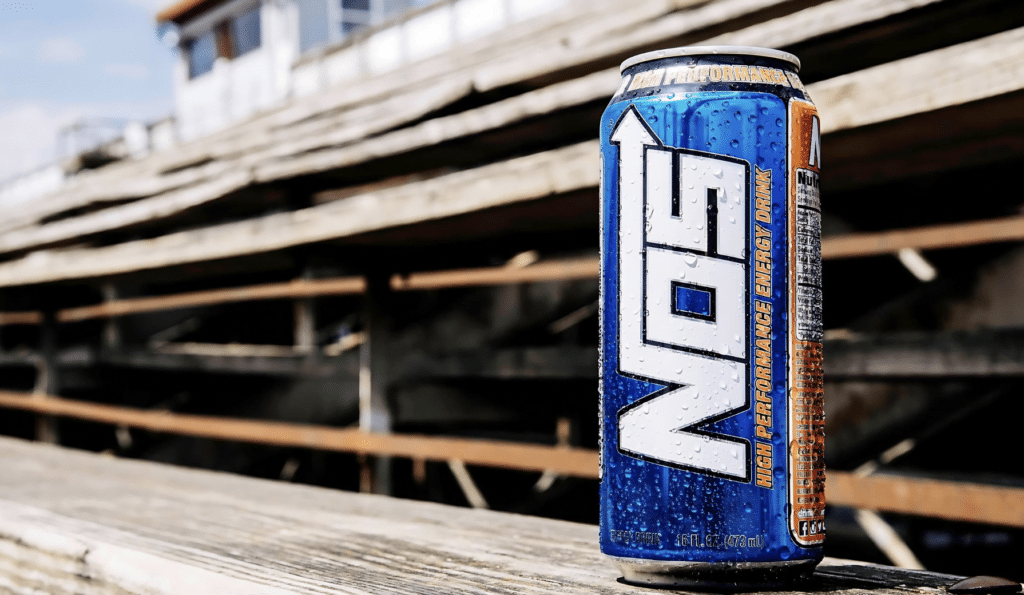
NOS energy drinks contain 160-260 mg of caffeine per 16-fl oz can, with the exact amount varying by flavor.
This brand draws inspiration from nitrous oxide systems used in racing, reflecting its high-energy positioning.
NOS combines caffeine with taurine and B vitamins, aiming to provide a sustained energy boost.
This formula appeals to consumers seeking a powerful and long-lasting energy kick, with the flexibility to choose different caffeine levels based on their preferred flavor.
5. G Fuel
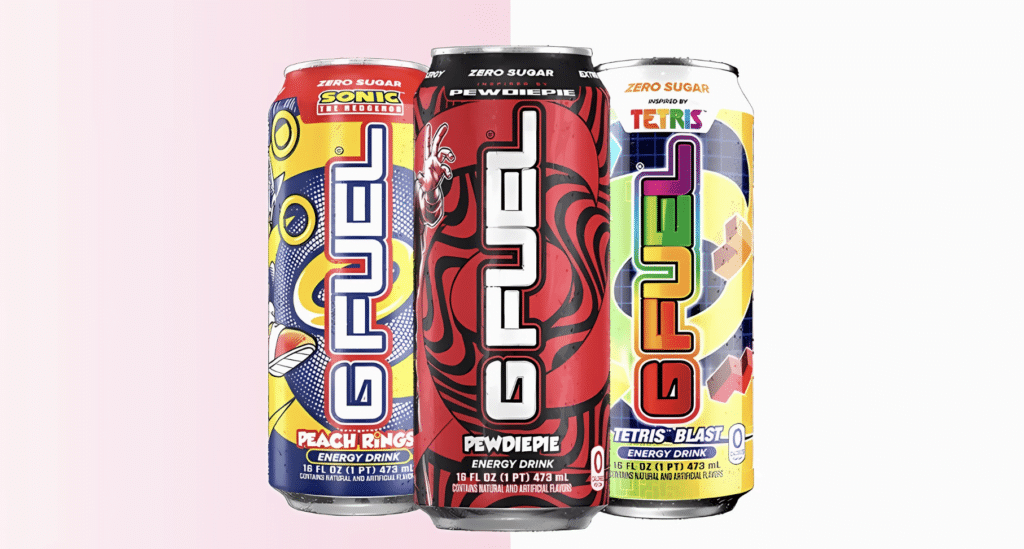
G Fuel delivers a potent 300 mg of caffeine in each 16 fl oz can, matching the high caffeine content of Bang Energy.
This brand has gained significant popularity among gamers, who often seek sustained energy and focus for long gaming sessions.
G Fuel stands out with its wide range of unique flavors, catering to diverse tastes.
Beyond caffeine, the drink includes additional focus-enhancing ingredients, making it a comprehensive energy and performance beverage tailored to the gaming community’s needs.
6. Spike Hardcore Energy
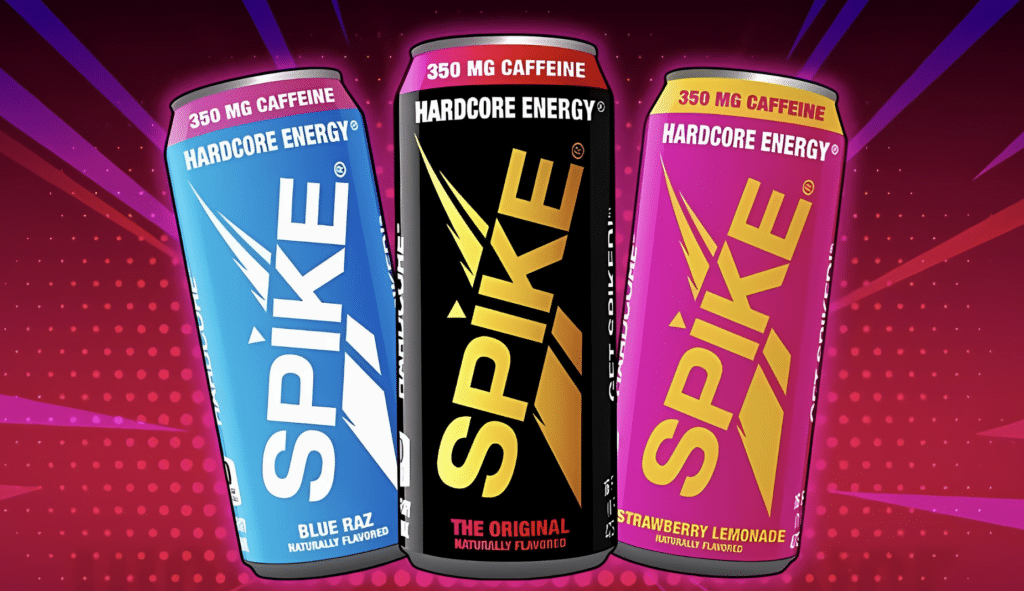
Spike Hardcore Energy packs 350 mg of caffeine per 16 fl oz can, making it one of the most potent energy drinks available.
It comes in three flavors: Original, Blue Raz, and Watermelon. In addition to high caffeine, Spike includes Beta-Alanine, L-tyrosine, and Citrulline and is sugar-free.
This combination targets consumers seeking an extreme energy boost with added performance-enhancing ingredients.
Given its high caffeine content, Spike Hardcore Energy is not recommended for those sensitive to caffeine or individuals new to energy drinks.
Detailed Analysis of Bang Energy
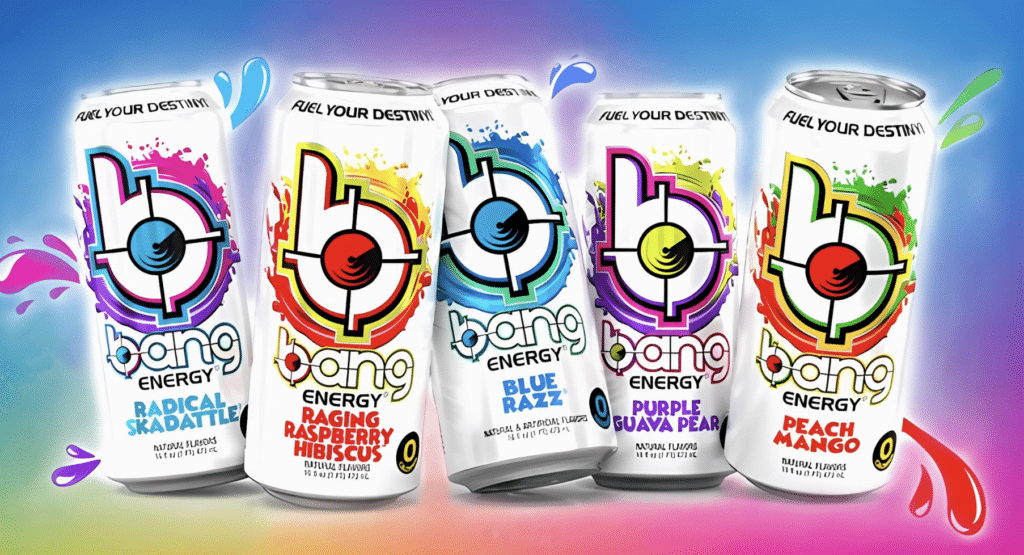
Bang Energy has diversified its product line to cater to various consumer preferences while maintaining its high caffeine content across most variations:
- Bang Energy (original): 300 mg per 16 oz can
- Bang Keto Coffee: 300 mg per 16 oz can, designed for keto diet followers
- Bang Shot: 300 mg in a compact 3 oz serving, ideal for quick consumption
- Bang Sweet Tea: 300 mg per 16 oz can, offering a familiar tea flavor
- Bang Natural: 250 mg per 16 oz can, with slightly less caffeine and natural ingredients
Bang is known for its diverse flavor range, including popular options like Bangster Berry, Blue Razz, and Radical Skadattle. These unique flavors contribute to Bang’s appeal among energy drink enthusiasts.
Bang’s formula goes beyond just caffeine, incorporating several functional ingredients:
- Creatine: May aid in muscle strength and power output
- BCAAs (Branched-Chain Amino Acids): Can support muscle recovery and growth
- Electrolytes: Help maintain hydration, especially during physical activity
- B Vitamins: Contribute to energy metabolism and overall health
- CoQ10: An antioxidant that may support heart health
This comprehensive blend positions Bang as an energy drink and a performance-enhancing beverage, particularly appealing to fitness enthusiasts and athletes.
The sugar-free formulation also caters to those watching their sugar intake.
Health Considerations of Drinking Energy Drinks
When consuming energy drinks like Bang, keep these health factors in mind:
1. Caffeine Intake
The FDA recommends a daily limit of 400 mg for adults. With Bang containing 300 mg per can, carefully monitor your total caffeine consumption.
Consider other caffeine sources in your diet, like coffee or tea.
Individual tolerance to caffeine can vary, so pay attention to how your body responds.
2. Sugar Content
While Bang is sugar-free, be aware that artificial sweeteners may have their health implications.
Some studies suggest these sweeteners might affect gut bacteria and insulin response.
If you’re sensitive to artificial sweeteners, you may want to explore other options.
3. High Caffeine Risks
Overconsumption can lead to jitters, anxiety, insomnia, and, in extreme cases, heart palpitations or caffeine overdose.
Regular high caffeine intake might lead to dependence, causing withdrawal symptoms when consumption is reduced.
It’s important to maintain a balanced approach to energy drink consumption.
3. Specific Populations
Children, pregnant women, and those with heart conditions should be especially cautious or avoid energy drinks altogether.
Adolescents may be particularly susceptible to caffeine’s effects due to their developing bodies.
Elderly individuals should also exercise caution as they may metabolize caffeine more slowly.
Conclusion
As we’ve explored the world of energy drinks, Bang Energy stands out with its potent 300mg caffeine punch. But remember, energy drinks aren’t one-size-fits-all.
Understanding your caffeine tolerance is key, whether you’re reaching for a Bang or sipping a Red Bull.
When choosing an energy drink, consider your daily habits, health status, and energy needs.
While these beverages can provide a quick pick-me-up, they’re not substitutes for proper sleep, nutrition, and hydration.
Ultimately, the best energy drink for you balances effectiveness with personal health considerations. As you navigate this energizing landscape, stay informed, listen to your body, and consume responsibly.
Your perfect energy boost is out there—it might just take some exploration to find it.
Frequently Asked Questions
Is it Safe to Consume Bang Energy Daily?
Drinking Bang Energy daily isn’t advised. With 300 mg of caffeine per can, it’s close to the FDA’s 400 mg daily limit. Consider your total caffeine intake from all sources.
Why Does Bang Energy Have Such High Caffeine Content?
Bang Energy targets fitness buffs and people needing big energy boosts. Its high caffeine helps improve workout results and keeps users alert and focused throughout the day.
Can I Mix Bang Energy with Alcohol?
Mixing Bang Energy with alcohol isn’t safe. It can hide alcohol’s effects, leading to drinking too much and risking alcohol poisoning.

